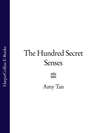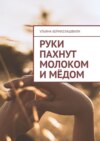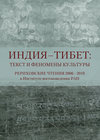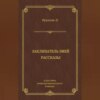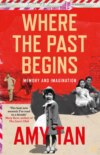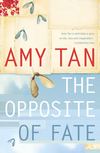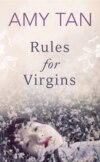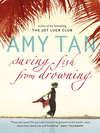Loe raamatut: «The Hundred Secret Senses»

The Hundred Secret Senses
AMY TAN

For Faith
To write this story, I depended on the indulgence, advice, conversations, and sustenance of many: Babalu, Ronald Bass, Linden and Logan Berry, Dr. Thomas Brady, Sheri Byrne, Joan Chen, Mary Clemmey, Dr. Asa DeMatteo, Bram and Sandra Dijkstra, Terry Doxey, Tina Eng, Dr. Joseph Esherick, Audrey Ferber, Robert Foothorap, Laura Gaines, Ann and Gordon Getty, Molly Giles, Amy Hempel, Anna Jardine, Peter Lee Kenfield, Dr. Eric Kim, Gus Lee, Cora Miao, Susanne Pari, the residents of Pei Sa Bao village, Robin and Annie Renwick, Gregory Asturo Riley, the Rock Bottom Remainders, Faith and Kirkpatrick Sale, Orville Schell, Gretchen Schields, the staff of Shelburne House Library, Kelly Simon, Dr. Michael Strong, Daisy Tan, John Tan, Dr. Steven Vandervort, Lijun Wang, Wayne Wang, Yuhang Wang, Russell Wong, the people of Yaddo, and Zo.
I thank them, but do not hold them accountable for the felicitous and sometimes unwitting ways in which they contributed to the truth of this fiction.
Table of Contents
Cover
Title Page
I
1 - THE GIRL WITH YIN EYES
2 - FISHER OF MEN
3 - THE DOG AND THE BOA
4 - THE GHOST MERCHANT’S HOUSE
5 - LAUNDRY DAY
II
6 - FIREFLIES
7 - THE HUNDRED SECRET SENSES
8 - THE CATCHER OF GHOSTS
9 - KWAN’S FIFTIETH
III
10 - KWAN’S KITCHEN
11 - NAME CHANGE
12 - THE BEST TIME TO EAT DUCK EGGS
13 - YOUNG GIRL’S WISH
14 - HELLO GOOD-BYE
15 - THE SEVENTH DAY
16 - BIG MA’S PORTRAIT
17 - THE YEAR OF NO FLOOD
18 - SIX-ROLL SPRING CHICKEN
19 - THE ARCHWAY
20 - THE VALLEY OF STATUES
21 - WHEN HEAVEN BURNED
22 - WHEN LIGHT BALANCES WITH DARK
IV
23 - THE FUNERAL
24 - ENDLESS SONGS
About the Author
Praise for The Hundred Secret Senses
BY THE SAME AUTHOR
P.S. Ideas, interviews & features…
About the author
Profile of Amy Tan
Q&A
Life at a Glance
MY FAVOURITE BOOKS
About the book
A Critical Eye
Extract from The Opposite of Fate
Read on
If You Liked This, Try…
Copyright
About the Publisher
I

1 THE GIRL WITH YIN EYES
My sister Kwan believes she has yin eyes. She sees those who have died and now dwell in the World of Yin, ghosts who leave the mists just to visit her kitchen on Balboa Street in San Francisco.
‘Libby-ah,’ she’ll say to me. ‘Guess who I see yesterday, you guess.’ And I don’t have to guess that she’s talking about someone dead.
Actually, Kwan is my half sister, but I’m not supposed to mention that publicly. That would be an insult, as if she deserved only fifty percent of the love from our family. But just to set the genetic record straight, Kwan and I share a father, only that. She was born in China. My brothers, Kevin and Tommy, and I were born in San Francisco after my father, Jack Yee, immigrated here and married our mother, Louise Kenfield.
Mom calls herself ‘American mixed grill, a bit of everything white, fatty, and fried.’ She was born in Moscow, Idaho, where she was a champion baton twirler and once won a county fair prize for growing a deformed potato that had the profile of Jimmy Durante. She told me she dreamed she’d one day grow up to be different – thin, exotic, and noble like Luise Rainer, who won an Oscar playing O-lan in The Good Earth. When Mom moved to San Francisco and became a Kelly girl instead, she did the next-best thing. She married our father. Mom thinks that her marrying out of the Anglo race makes her a liberal. ‘When Jack and I met,’ she still tells people, ‘there were laws against mixed marriages. We broke the law for love.’ She neglects to mention that those laws didn’t apply in California.
None of us, including my mom, met Kwan until she was eighteen. In fact, Mom didn’t even know Kwan existed until shortly before my father died of renal failure. I was not quite four when he passed away. But I still remember moments with him. Falling down a curly slide into his arms. Dredging the wading pool for pennies he had tossed in. And the last day I saw him in the hospital, hearing what he said that scared me for years.
Kevin, who was five, was there. Tommy was just a baby, so he was in the waiting room with my mom’s cousin, Betty Dupree – we had to call her Aunt Betty – who had moved out from Idaho as well. I was sitting on a sticky vinyl chair, eating a bowl of strawberry Jell-O cubes that my father had given me from his lunch tray. He was propped up in bed, breathing hard. Mom would cry one minute, then act cheerful. I tried to figure out what was wrong. The next thing I remember, my father was whispering and Mom leaned in close to listen. Her mouth opened wider and wider. Then her head turned sharply toward me, all twisted with horror. And I was terror-struck. How did he know? How did Daddy find out I flushed my turtles, Slowpoke and Fastpoke, down the toilet that morning? I had wanted to see what they looked like without their coats on, and ended up pulling off their heads.
‘Your daughter?’ I heard my mom say. ‘Bring her back?’ And I was sure that he had just told her to bring me to the pound, which is what he did to our dog Buttons after she chewed up the sofa. What I recall after that is a jumble: the bowl of Jell-O crashing to the floor, Mom staring at a photo, Kevin grabbing it and laughing, then me seeing this tiny black-and-white snapshot of a skinny baby with patchy hair. At some point, I heard my mother shouting: ‘Olivia, don’t argue, you have to leave now.’ And I was crying, ‘But I’ll be good.’
Soon after that, my mother announced: ‘Daddy’s left us.’ She also told us she was going to bring Daddy’s other little girl from China to live in our house. She didn’t say she was sending me to the pound, but I still cried, believing everything was vaguely connected – the headless turtles whirling down the toilet, my father abandoning us, the other girl who was coming soon to take my place. I was scared of Kwan before I ever met her.
When I was ten, I learned that my father’s kidneys had killed him. Mom said he was born with four instead of the usual two, and all of them were defective. Aunt Betty had a theory about why this happened. She always had a theory, usually obtained from a source like the Weekly World News. She said he was supposed to be a Siamese twin. But in the womb, my father, the stronger twin, gobbled up the weaker one and grafted on the two extra kidneys. ‘Maybe he also had two hearts, two stomachs, who knows.’ Aunt Betty came up with this scenario around the time that Life magazine ran a pictorial about Siamese twins from Russia. I saw the same story: two girls, Tasha and Sasha, conjoined at the hip, too heart-breakingly beautiful to be freaks of nature. This must have been in the mid-sixties, around the time I learned fractions. I remember wishing we could exchange Kwan for those Siamese twins. Then I’d have two half sisters, which equaled a whole, and I figured all the kids on the block would try to be our friends, hoping we’d let them watch as we jumped rope or played hopscotch.
Aunt Betty also passed along the story of Kwan’s birth, which was not heartbreaking, just embarrassing. During the war, she said, my father had been a university student in Guilin. He used to buy live frogs for his supper at the outdoor market from a young woman named Li Chen. He later married her, and in 1944 she gave birth to their daughter, the skinny baby in the picture, Kwan.
Aunt Betty had a theory about the marriage as well. ‘Your dad was good-looking, for a Chinese man. He was college-educated. And he spoke English like me and your mom. Now why would he marry a little peasant girl? Because he had to, that’s why.’ By then, I was old enough to know what had to meant.
Whatever the case, in 1948, my father’s first wife died of a lung disease, perhaps TB. My father went to Hong Kong to search for work. He left Kwan in the care of his wife’s younger sister, Li Bin-bin, who lived in a small mountain village called Changmian. Of course, he sent money for their support – what father would not? But in 1949, the Communists took over China, and it was impossible for my father to return for his five-year-old daughter. So what else could he do? With a heavy heart, he left for America to start a new life and forget about the sadness he left behind. Eleven years later, while he was dying in the hospital, the ghost of his first wife appeared at the foot of his bed. ‘Claim back your daughter,’ she warned, ‘or suffer the consequences after death!’ That’s the story my father gave just before he died – that is, as told by Aunt Betty years later.
Looking back, I can imagine how my mom must have felt when she first heard this. Another wife? A daughter in China? We were a modern American family. We spoke English. Sure, we ate Chinese food, but take-out, like everyone else. And we lived in a ranch-style house in Daly City. My father worked for the Government Accounting Office. My mother went to PTA meetings. She had never heard my father talk about Chinese superstitions before; they attended church and bought life insurance instead.
After my father died, my mother kept telling everyone how he had treated her ‘just like a Chinese empress.’ She made all sorts of grief-stricken promises to God and my father’s grave. According to Aunt Betty, at the funeral, my mother vowed never to remarry. She vowed to teach us children to do honor to the Yee family name. She vowed to find my father’s firstborn child, Kwan, and bring her to the United States.
The last promise was the only one she kept.
My mother has always suffered from a kind heart, compounded by seasonal rashes of volunteerism. One summer, she was a foster mother for Yorkie Rescue; the house still stinks of dog pee. For two Christmases, she dished out food to the homeless at St. Anthony’s Dining Room; now she goes away to Hawaii with whoever is her current boyfriend. She’s circulated petitions, done fund-raising, served on boards of alternative-health groups. While her enthusiasm is genuine, eventually, always, it runs out and then she’s on to something new. I suspect she thought of Kwan as a foreign exchange student she would host for a year, a Chinese Cinderella, who would become self-sufficient and go on to have a wonderful American life.
During the time before Kwan came, Mom was a cheerleader, rallying my brothers and me to welcome a big sister into our lives. Tommy was too little to do anything except nod whenever Mom said, ‘Aren’t you excited about having another big sister?’ Kevin just shrugged and acted bored. I was the only one who did jumping jacks like a gung-ho recruit, in part because I was ecstatic to learn Kwan would be in addition to me, not instead of.
Although I was a lonely kid, I would have preferred a new turtle or even a doll, not someone who would compete for my mother’s already divided attention and force me to share the meager souvenirs of her love. In recalling this, I know that my mother loved me – but not absolutely. When I compared the amount of time she spent with others – even total strangers – I felt myself sliding further down the ranks of favorites, getting bumped and bruised. She always had plenty of room in her life for dates with men or lunch with her so-called gal pals. With me, she was unreliable. Promises to take me to the movies or the public pool were easily erased with excuses or forgetfulness, or worse, sneaky variations of what was said and what was meant: ‘I hate it when you pout, Olivia,’ she once told me. ‘I didn’t guarantee I’d go to the swim club with you. I said I would like to.’ How could I argue my need against her intention?
I learned to make things not matter, to put a seal on my hopes and place them on a high shelf, out of reach. And by telling myself that there was nothing inside those hopes anyway, I avoided the wounds of deep disappointment. The pain was no worse than the quick sting of a booster shot. And yet thinking about this makes me ache again. How is it that as a child I knew I should have been loved more? Is everyone born with a bottomless emotional reservoir?
So of course, I didn’t want Kwan as my sister. Just the opposite. Which is why I made great efforts in front of my mother to appear enthusiastic. It was a distorted form of inverse logic: If hopes never come true, then hope for what you don’t want.
Mom had said that a big sister was a bigger version of myself, sweet and beautiful, only more Chinese, and able to help me do all kinds of fun things. So I imagined not a sister but another me, an older self who danced and wore slinky clothes, who had a sad but fascinating life, like a slant-eyed version of Natalie Wood in West Side Story, which I saw when I was five. It occurs to me only now that my mother and I both modeled our hopes after actresses who spoke in accents that weren’t their own.
One night, before my mother tucked me in bed, she asked me if I wanted to pray. I knew that praying meant saying the nice things that other people wanted to hear, which is what my mom did. So I prayed to God and Jesus to help me be good. And then I added that I hoped my big sister would come soon, since my mother had just been talking about that. When I said, ‘Amen,’ I saw she was crying and smiling proudly. Under my mother’s eye I began to collect welcome presents for Kwan. The scarf my aunt Betty gave me for my birthday, the orange blossom cologne I received at Christmas, the gooey Halloween candy – I lovingly placed all these scratchy, stinky, stale items into a box my mother had marked ‘For Olivia’s big sister.’ I convinced myself I had become so good that soon Mom would realize we didn’t need another sister.
My mother later told my brothers and me how difficult it was to find Kwan. ‘In those days,’ she said, ‘you couldn’t just write a letter, stick a stamp on it, and send it to Changmian. I had to cut through mounds of red tape and fill out dozens of forms. And there weren’t too many people who’d go out of their way to help someone from a communist country. Aunt Betty thought I was crazy! She said to me, “How can you take in a nearly grown girl who can’t speak a word of English? She won’t know right from wrong or left from right.”’
Paperwork wasn’t the only obstacle Kwan had to unknowingly surmount. Two years after my father died, Mom married Bob Laguni, whom Kevin today calls ‘the fluke in our mother’s history of dating foreign imports – and that’s only because she thought Laguni was Mexican instead of Italian.’ Mom took Bob’s name, and that’s how my brothers and I also ended up with Laguni, which I gladly changed to Bishop when I married Simon. The point is, Bob never wanted Kwan to come in the first place. And my mom usually put his wishes above everyone else’s. After they divorced – I was in college by then – Mom told me how Bob pressured her, just before they were married, to cancel the paperwork for Kwan. I think she intended to and forgot. But this is what she told me: ‘I watched you pray. You looked so sweet and sad, asking God, “Please send me my big sister from China.”’
I was nearly six by the time Kwan came to this country. We were waiting for her at the customs area of San Francisco Airport. Aunt Betty was also there. My mother was nervous and excited, talking non-stop: ‘Now listen, kids, she’ll probably be shy, so don’t jump all over her. … And she’ll be skinny as a beanpole, so I don’t want any of you making fun of her. …’
When the customs official finally escorted Kwan into the lobby where we were waiting, Aunt Betty pointed and said, ‘That’s her. I’m telling you that’s her.’ Mom was shaking her head. This person looked like a strange old lady, short and chubby, not exactly the starving waif Mom pictured or the glamorous teenage sister I had in mind. She was dressed in drab gray pajamas, and her broad brown face was flanked by two thick braids.
Kwan was anything but shy. She dropped her bag, fluttered her arms, and bellowed, ‘Hall-oo! Hall-oo!’ Still hooting and laughing, she jumped and squealed the way our new dog did whenever we let him out of the garage. This total stranger tumbled into Mom’s arms, then Daddy Bob’s. She grabbed Kevin and Tommy by the shoulders and shook them. When she saw me, she grew quiet, squatted on the lobby floor, and held out her arms. I tugged on my mother’s skirt. ‘Is that my big sister?’
Mom said, ‘See, she has your father’s same thick, black hair.’
I still have the picture Aunt Betty took: curly-haired Mom in a mohair suit, flashing a quirky smile; our Italo-American stepfather, Bob, appearing stunned; Kevin and Tommy mugging in cowboy hats; a grinning Kwan with her hand on my shoulder; and me in a frothy party dress, my finger stuck in my bawling mouth.
I was crying because just moments before the photo was taken, Kwan had given me a present. It was a small cage of woven straw, which she pulled out of the wide sleeve of her coat and handed to me proudly. When I held it up to my eyes and peered between the webbing, I saw a six-legged monster, fresh-grass green, with saw-blade jaws, bulging eyes, and whips for eyebrows. I screamed and flung the cage away.
At home, in the bedroom we shared from then on, Kwan hung the cage with the grasshopper, now missing one leg. As soon as night fell, the grasshopper began to chirp as loudly as a bicycle bell warning people to get out of the road.
After that day, my life was never the same. To Mom, Kwan was a handy baby-sitter, willing, able, and free. Before my mother took off for an afternoon at the beauty parlor or a shopping trip with her gal pals, she’d tell me to stick to Kwan. ‘Be a good little sister and explain to her anything she doesn’t understand. Promise?’ So every day after school, Kwan would latch on to me and tag along wherever I went. By the first grade, I became an expert on public humiliation and shame. Kwan asked so many dumb questions that all the neighborhood kids thought she had come from Mars. She’d say: ‘What M&M?’ ‘What ching gum?’ ‘Who this Popeys Sailor Man? Why one eye gone? He bandit?’ Even Kevin and Tommy laughed.
With Kwan around, my mother could float guiltlessly through her honeymoon phase with Bob. When my teacher called Mom to say I was running a fever, it was Kwan who showed up at the nurse’s office to take me home. When I fell while roller-skating, Kwan bandaged my elbows. She braided my hair. She packed lunches for Kevin, Tommy, and me. She tried to teach me to sing Chinese nursery songs. She soothed me when I lost a tooth. She ran the washcloth over my neck while I took my bath.
I should have been grateful to Kwan. I could always depend on her. She liked nothing better than to be by my side. But instead, most of the time, I resented her for taking my mother’s place.
I remember the day it first occurred to me to get rid of Kwan. It was summer, a few months after she had arrived. Kwan, Kevin, Tommy, and I were sitting on our front lawn, waiting for something to happen. A couple of Kevin’s friends sneaked to the side of our house and turned on the sprinkler system. My brothers and I heard the telltale spit and gurgle of water running into the lines, and we ran off just before a dozen sprinkler heads burst into spray. Kwan, however, simply stood there, getting soaked, marveling that so many springs had erupted out of the earth all at once. Kevin and his friends were howling with laughter. I shouted, ‘That’s not nice.’
Then one of Kevin’s friends, a swaggering second-grader whom all the little girls had a crush on, said to me, ‘Is that dumb Chink your sister? Hey, Olivia, does that mean you’re a dumb Chink too?’
I was so flustered I yelled, ‘She’s not my sister! I hate her! I wish she’d go back to China!’ Tommy later told Daddy Bob what I had said, and Daddy Bob said, ‘Louise, you better do something about your daughter.’ My mother shook her head, looking sad. ‘Olivia,’ she said, ‘we don’t ever hate anyone. “Hate” is a terrible word. It hurts you as much as it hurts others.’ Of course, this only made me hate Kwan even more.
The worst part was sharing my bedroom with her. At night, she liked to throw open the curtains so that the glare of the street lamp poured into our room, where we lay side by side in our matching twin beds. Under this ‘beautiful American moon,’ as she called it, Kwan would jabber away in Chinese. She kept on talking while I pretended to be asleep. She’d still be yakking when I woke up. That’s how I became the only one in our family who learned Chinese. Kwan infected me with it. I absorbed her language through my pores while I was sleeping. She pushed her Chinese secrets into my brain and changed how I thought about the world. Soon I was even having nightmares in Chinese.
In exchange, Kwan learned her English from me – which, now that I think of it, may be the reason she has never spoken it all that well. I was not an enthusiastic teacher. One time, when I was seven, I played a mean trick on her. We were lying in our beds in the dark.
‘Libby-ah,’ Kwan said. And then she asked in Chinese, ‘The delicious pear we ate this evening, what’s its American name?’
‘Barf,’ I said, then covered my mouth to keep her from hearing my snickers.
She stumbled over this new sound – ‘bar-a-fa, bar-a-fa’ – before she said, ‘Wah! What a clumsy word for such a delicate taste. I never ate such good fruit. Libby-ah, you are a lucky girl. If only my mother did not die.’ She could segue from just about any topic to the tragedies of her former life, all of which she conveyed to me in our secret language of Chinese.
Another time, she watched me sort through Valentine’s Day cards I had spilled onto my bed. She came over and picked up a card. ‘What’s this shape?’
‘It’s a heart. It means love. See, all the cards have them. I have to give one to each kid in my class. But it doesn’t really mean I love everyone.’
She went back to her own bed and lay down. ‘Libby-ah,’ she said, ‘If only my mother didn’t die of heartsickness.’ I sighed, but didn’t look at her. This again. She was quiet for a few moments, then went on. ‘Do you know what heartsickness is?’
‘What?’
‘It’s warming your body next to your family, then having the straw roof blow off and carry you away.’
‘Oh.’
‘You see, she didn’t die of lung sickness, no such thing.’
And then Kwan told me how our father caught a disease of too many good dreams. He could not stop thinking about riches and an easier life, so he became lost, floated out of their lives, and washed away his memories of the wife and baby he left behind.
‘I’m not saying our father was a bad man,’ Kwan whispered hoarsely. ‘Not so. But his loyalty was not strong. Libby-ah, do you know what loyalty is?’
‘What?’
‘It’s like this. If you ask someone to cut off his hand to save you from flying off with the roof, he immediately cuts off both hands to show he is more than glad to do so.’
‘Oh.’
‘But our father didn’t do this. He left us when my mother was about to have another baby. I’m not telling you lies, Libby-ah, this is true. When this happened, I was four years old by my Chinese age. I can never forget lying against my mother, rubbing her swollen belly. Like a watermelon, she was this big.’
She reached out her arms as far as she could. ‘Then all the water in her belly poured out as tears from her eyes, she was so sad.’ Kwan’s arms fell suddenly to her sides. ‘That poor starving baby in her belly ate a hole in my mother’s heart, and they both died.’
I’m sure Kwan meant some of this figuratively. But as a child, I saw everything Kwan talked about as literal truth: chopped-off hands flying out of a roofless house, my father floating on the China Sea, the little baby sucking on his mother’s heart. The images became phantoms. I was like a kid watching a horror movie, with my hands clapped to my eyes, peering anxiously through the cracks. I was Kwan’s willing captive, and she was my protector.
At the end of her stories, Kwan would always say: ‘You’re the only one who knows. Don’t tell anyone. Never. Promise, Libby-ah?’
And I would always shake my head, then nod, drawn to allegiance through both privilege and fear.
One night, when my eyelids were already heavy with sleep, she started droning again in Chinese: ‘Libby-ah, I must tell you something, a forbidden secret. It’s too much of a burden to keep inside me any longer.’
I yawned, hoping she’d take the hint.
‘I have yin eyes.’
‘What eyes?’
‘It’s true. I have yin eyes. I can see yin people.’
‘What do you mean?’
‘Okay, I’ll tell you. But first you must promise never to tell anyone. Never. Promise, ah?’
‘Okay. Promise.’
‘Yin people, they are those who have already died.’
My eyes popped open. ‘What? You see dead people? … You mean, ghosts?’
‘Don’t tell anyone. Never. Promise, Libby-ah?’
I stopped breathing. ‘Are there ghosts here now?’ I whispered.
‘Oh yes, many. Many, many good friends.’
I threw the covers over my head. ‘Tell them to go away,’ I pleaded.
‘Don’t be afraid. Libby-ah, come out. They’re your friends too. Oh see, now they’re laughing at you for being so scared.’
I began to cry. After a while, Kwan sighed and said in a disappointed voice, ‘All right, don’t cry anymore. They’re gone.’
So that’s how the business of ghosts got started. When I finally came out from under the covers, I saw Kwan sitting straight up, illuminated by the artificial glow of her American moon, staring out the window as if watching her visitors recede into the night.
The next morning, I went to my mother and did what I promised I’d never do: I told her about Kwan’s yin eyes.
Now that I’m an adult, I realize it wasn’t my fault that Kwan went to the mental hospital. In a way, she brought it on herself. After all, I was just a little kid then, seven years old. I was scared out of my mind. I had to tell my mother what Kwan was saying. I thought Mom would just ask her to stop. Then Daddy Bob found out about Kwan’s ghosts and blew his stack. Mom suggested taking her to Old St. Mary’s for a talk with the priest. But Daddy Bob said no, confession wouldn’t be enough. He booked Kwan into the psychiatric ward at Mary’s Help instead.
When I visited her there the following week, Kwan whispered to me: ‘Libby-ah, listen, I have secret. Don’t tell anyone, ah?’ And then she switched to Chinese. ‘When the doctors and nurses ask me questions, I treat them like American ghosts – I don’t see them, don’t hear them, don’t speak to them. Soon they’ll know they can’t change me, why they must let me go.’ I remember the way she looked, as immovable as a stone palace dog.
Unfortunately, her Chinese silent treatment backfired. The doctors thought Kwan had gone catatonic. Things being what they were back in the early 1960s, the doctors diagnosed Kwan’s Chinese ghosts as a serious mental disorder. They gave her electro-shock treatments, once, she said, then twice, she cried, then over and over again. Even today it hurts my teeth to think about that.
The next time I saw her at the hospital, she again confided in me. ‘All that electricity loosened my tongue so I could no longer stay silent as a fish. I became a country duck, crying gwa-gwa-gwa! – bragging about the World of Yin. Then four bad ghosts shouted, “How can you tell our secrets?” They gave me a yin-yang tou – forced me to tear out half my hair. That’s why the nurses shaved everything off. I couldn’t stop pulling, until one side of my head was bald like a melon, the other side hairy like a coconut. The ghosts branded me for having two faces: one loyal, one traitor. But I’m not a traitor! Look at me, Libby-ah. Is my face loyal? What do you see?’
What I saw paralyzed me with fear. She looked as if she’d been given a crew cut with a hand-push lawn mower. It was as bad as seeing an animal run over on the street, wondering what it once had been. Except I knew how Kwan’s hair used to be. Before, it flowed past her waist. Before, my fingers swam through its satin-black waves. Before, I’d grab her mane and yank it like the reins of a mule, shouting, ‘Giddyap, Kwan, say hee-haw!’
She took my hand and rubbed it across her sandpapery scalp, whispering about friends and enemies in China. On and on she went, as if the shock treatments had blown off the hinges of her jaw and she could not stop. I was terrified I’d catch her crazy talking disease.
To this day, I don’t know why Kwan never blamed me for what happened. I’m sure she knew I was the one who got her in trouble. After she came back from Mary’s Help, she gave me her plastic ID bracelet as a souvenir. She talked about the Sunday-school children who came to the hospital to sing ‘Silent Night,’ how they screamed when an old man yelled, ‘Shut up!’ She reported that some patients there were possessed by ghosts, how they were not like the nice yin people she knew, and this was a real pity. Not once did she ever say, ‘Libby-ah, why did you tell my secret?’
Yet the way I remember it is the way I have always felt – that I betrayed her and that’s what made her insane. The shock treatments, I believed, were my fault as well. They released all her ghosts.
